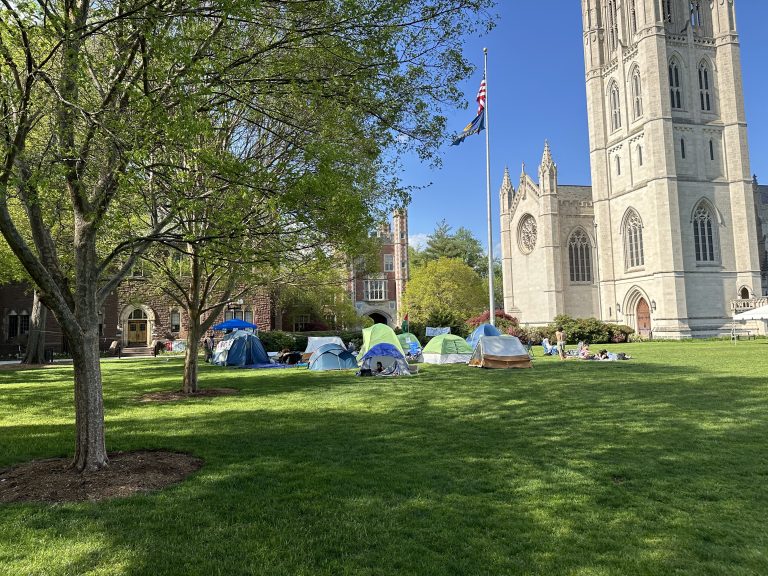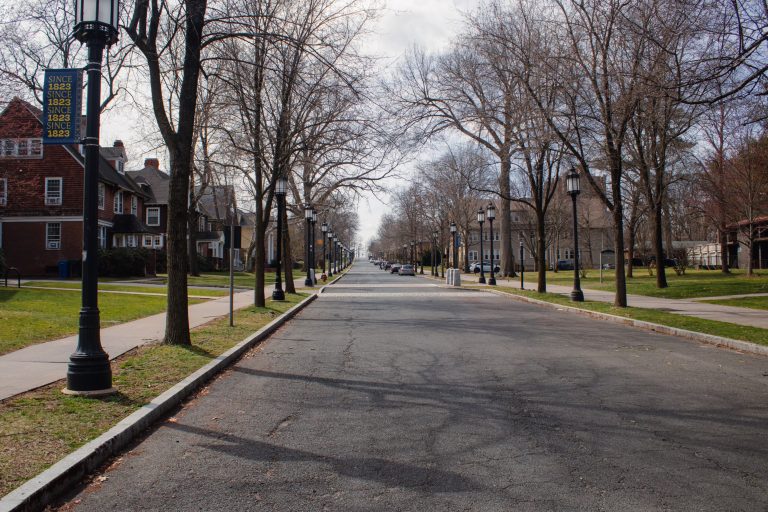Gillian Reinhard ’20
Special to the Tripod
The end of the 1960s and beginning of the 1970s were some of the most eventful and dynamic years in Trinity’s history. Nowhere is this better expressed than in the pages of the The Trinity Tripod. By 1969, discussion in the student newspaper centered around a few key events, including—a new curriculum, the sit-in protest the year prior, a changing role and structure for student government, and, most significantly, the College’s decision to become a coeducational institution. This change was commemorated in a special issue of the Tripod, released on Jan. 16, 1969. In it, the staff expressed support for the decision, which welcomed transfer students from Vassar. The Tripod also tracked the opening of Cinestudio and the establishment of the Trinity-in-Rome program in 1969.
Members of the administration, including then-Trinity President Theodore Lockwood and Associate Dean of Academics J. Ron Spencer, served as regular contributors to the Tripod. They frequently engaged with student life in the newspaper, where the Tripod reported the changes coeducation brought to the College—including improved academic performance, alumni support, and a dissatisfaction amongst some female students with the social culture at Trinity. Contributors to the Tripod argued fiercely for more support from the College in admitting female and minority students.
Though much was occurring on campus, Tripod editorials in the early 1970s criticized then-US President Nixon. In 1970, the Tripod signed a joint editorial with student newspapers at Columbia, Cornell, Rutgers, Penn., Harvard, Princeton, and others to voice concerns against Nixon’s “unwarranted decision” to send forces to Cambodia. Like many student publications, the Tripod strongly criticized the Vietnam War. By the late 1970s, the Tripod added a Connecticut segment to its news section, committed to establishing a closer relationship between Hartford and the student body. On March 7, 1978, 860 signed a student government-led petition to protest the lack of student visibility in administration decisions. Shortly after, the Trinity College Blacks organization (TCB) marched to protest the racial climate at Trinity. A 1980 Tripod editorial which reflected on the 1970s at Trinity remarked that the decade was defined by “protest, racism, tuition hikes, and dissatisfaction with housing and food.”

After a small decline in popularity in the 1970s, the Tripod reported that Greek life was becoming more popular at Trinity in the early 1980s—citing an “uptick in pledging and brand-new sororities.” Student life seemed to become more vibrant during this time. Even the Tripod had competition from other student publications, such as The Trinity Observer and the Questioner. Despite improvements in campus life in some areas, racial harassment and instances of sexism at parties increased. In 1982, the Tripod reported on the faculty vote to eliminate fraternities, where professors urged then-President English to phase out Greek life organizations over the course of three years. Opinions varied in the Tripod, while the paper’s staff acknowledged the “outsourced role of fraternities in perpetuating racism and sexism.” Despite this, the paper stated that 75% of students felt fraternities should remain on campus, with important changes made such as the implementation of a no hazing rule. Off-campus, Tripod pieces attacked US President Reagan and debated the ramifications of the Cold War.
By 1991, fraternities were back in the spotlight, to mixed opinion in the Tripod. The early 1990s also saw reactions to college rankings. A Tripod editorial pointed toward low student engagement and party culture at Trinity as responsible for a lesser ranking in comparison to NESCAC peers. In 1992, the College enacted a rule mandating all Greek organizations must take both male and female members. Judging by several irate pieces published in the Tripod, this decision pleased neither those in favor of keeping Greek life on campus nor those in favor of abolishing it. The 1990s also saw an increasingly critical stance amongst the student body against the administration, particularly then-Trinity President Tom Gerety. When Gerety left the College to be replaced by President Borden Painter, student opinion in the Tripod shifted toward a more positive reception of the administration.
“Trinity students and administrators are creatures of habit,” wrote the Tripod staff in 1997. “Every semester, the same issues arise. Drinking, Greek life, diversity, apathy, safety, dorm damage. These are not new topics, but each year there is a new twist on the old themes.” The Tripod noted that Trinity was at a “crossroad” in 1999. In a separate editorial, the staff called for the administration to reevaluate the social culture at Trinity in hopes of a “bold new vision for the future.”
Despite this, the spirit of an intense party culture seemed to be continually represented in the Tripod. The 2000 Spring Weekend was announced as canceled, allegedly because of excessive rowdiness in Trinity students. Seven years into Trinity’s co-ed mandate, Tripod editors critiqued the new Greek life system as inefficient in solving a campus culture problem. Then-Trinity President Richard Hersh took a strong stance against binge drinking on-campus, but his communication with the student body was harshly criticized. The Tripod also reported on several “raids” at the Tap Café, when up to forty Trinity students were held in jail.

A year later, the Trinity community reacted to the tragedy of 9/11, with many writing into the Tripod to express their support for Muslim students, as the paper had also reported a rise in hate crimes and bullying toward Muslims on campus. Later, Tripod editorials attacked the Iraq War.
In the early 2000s, life at Trinity was rapidly changing for students with the implementation of IDs, the TCOnline system, and the rising popularity of personal computers and laptops. At the Tripod, new technology changed the paper, as well. At around 2000, the Tripod masthead noted its first online editor and an online website, trinitytripod.com, which brought the paper to a larger audience than ever seen before. Despite this, different online mediums competed with the Tripod as a source of information for the student body. The Daily Jolt, TrinTalk.com, and Facebook in its earliest days all seemed to serve as popular mediums for students to receive information and have discussions on student life.
In 2004, the Tripod celebrated its centennial anniversary. A short editorial in the paper commemorated the occasion and a party was held in Hamlin Hall. By this time, the Tripod was nearly over 22-pages each week, with many weekly segments such as Trinity Mini-Feed, Around Trinity, Along the Long Walk, Gossip Girlz, Horoscopes, and Dear Jimmy, a weekly in-depth interview with then-Trinity President Jimmy Jones.
Trinity made national news in 2006, when The New York Times published a damaging article on the College titled “An Inward Look at Racial Tension at Trinity College.” The article detailed a student in blackface for a party as well as Trinity’s low number of BIPOC students in comparison to its peers. Reactions in the Tripod to the article were mixed, though in the following years, the paper reported that President Jones was actively creating suggestions to change the social culture at Trinity.

On April 15, 2008, student opinion on the College administration seemed completely negative, with the publication of an issue provocatively titled, “President Jones, We Protest.” The issue featured over 700 student signatures unhappy with the College’s response to safety issues on campus. The Tripod was also heavily critical of the campus safety department, citing a rise of crime on campus. The issue, with its hundreds of signatures, was based on a Tripod issue from the 1960s, which protested drinking rules on campus at the time.
Off campus, the Tripod closely covered student opinion on the 2008 Presidential Election, with most student contributors to the Tripod excited about the campaign of Barack Obama. Several pieces sharply attacked Vice Presidential candidate Sarah Palin. The impact of the Recession on Trinity was also apparent in the pages of the Tripod. Trinity once again made national news in the fall of 2008, when The Wall Street Journal reported that the “financially strapped college” was dipping into the $9 million endowment from Shelby Cullom Davis against donor wishes. Opinions in the Tripod shifted even more negatively against the administration.
In the fall of 2010, the Tripod seemed unable to keep up its printing schedule with the removal of the more humorous segments such as Around Trinity. The editor-in-chief at the time made somewhat desperate appeals to the College for guidance on the paper. Additionally, the staff called a town hall meeting for the entire community to discuss the Tripod, with limited improvements made.Tensions were memorably high at Trinity around 2012, when President Jones initiated a “co-ed mandate,” Trinity’s third attempt to curb—or eliminate—fraternities in the past fifty years. Initially, student opinion in the Tripod was mixed. The staff even released an editorial in support of the decision to insist all organizations take both male and female identifying members, as well as the elimination of the pledging process. However, backlash arose particularly from underclassmen as the mandate went on. A March 2014 town hall expressed universal distrust in the administration. After over 100 years of editorials on student apathy at Trinity, the Tripod began to report on widespread student dialogue and protest. The intense reaction led to Jones retiring a year early from Trinity, and student support for a new president was high by 2014.
This history is meant to be an incomplete look at the Tripod over the course of over a hundred years. It is by no means meant to be an authoritative, complete history and any comments, additions, or suggestions may be sent to tripod@trincoll.edu.












+ There are no comments
Add yours